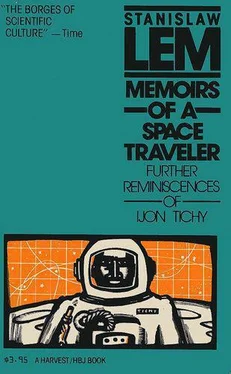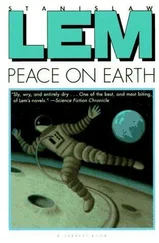“Why don’t you go?” he mumbled without turning around. “That would be best.”
I did not want to leave like that. The scene, which later, in my memory, would strike me as grotesque — the copper vat filled with those oozing intestines that had turned his body into an involuntary messenger of unknown signals — at that moment horrified me and filled me with pity for the man. That is why I would prefer to end my story here. For what happened afterward was senseless: his outburst against me, that I had — he said — intruded; his angry face, the insults and the shouting — all that, and the submissive silence with which I left, seemed like a cliched nightmare. To this day I do not know whether he threw me out of his gloomy house because he wanted to or whether…
But I could be wrong. Possibly both of us then were the victims of a delusion, and we hypnotized each other. Such things do happen.
But, then, how is one to explain the discovery made quite accidentally about a month after my Cretan expedition? While investigating a malfunction in a power line not far from Diagoras’s estate, several workmen tried to gain entrance to his house. At first they were unsuccessful. When they finally broke in, they found the building deserted and all the machines destroyed, except for two large copper vats that were untouched and completely empty.
I alone know what they contained, and it is precisely for that reason that I dare not make conjectures connecting those contents with the disappearance of their creator, who has not been seen since.
LET US SAVE THE UNIVERSE
(An Open Letter from Ijon Tichy)
After a long stay on Earth I set out to visit my favorite places from my previous expeditions — the spherical clusters of Perseus, the constellation of the Calf, and the large stellar cloud in the center of the Galaxy. Everywhere I found changes, which are painful for me to write about, because they are not changes for the better. There is much talk nowadays about the growth of cosmic tourism. Without question tourism is wonderful, but everything should be in moderation.
The eyesores begin as soon as you are out the door. The asteroid belt between Mars and Jupiter is in deplorable condition. Those monumental rocks, once enveloped in eternal night, are lit up now, and to make matters worse, every crag is carved with initials and monograms.
Eros, the particular favorite of lovers, shakes from the explosions with which self-taught calligraphers gouge inscriptions in its crust. A couple of shrewd operators there rent out hammers, chisels, and even pneumatic drills, and a man cannot find an untouched rock in what were once the most rugged areas.
Everywhere are graffiti like IT WAS LOVE AT FIRST SIGHT ON THIS HERE METEORITE, and arrow-pierced hearts in the worst taste. On Ceres, which for some reason large families like, there is a veritable plague of photography. The many photographers there don’t just rent out spacesuits for posing, but cover mountainsides with a special emulsion and for a nominal fee immortalize on them entire groups of vacationers. The huge pictures are then glazed to make them permanent. Suitably posed families — father, mother, grandparents, children — smile from cliffs. This, as I read in some prospectus, creates a “family atmosphere.” As regards Juno, that once beautiful planetoid is all but gone; anyone who feels like it chips stones off it and hurls them into space. People have spared neither nickel-iron meteors (which have gone into souvenir signet rings and cuff links) nor comets. You won’t find a comet with its tail intact any more.
I thought I would escape the congestion of cosmobuses, the family portraits on cliffs, and the graffiti doggerel once I left the Solar System. Was I wrong!
Professor Bruckee from the observatory complained to me recently that both stars in Centaurus were growing dim. How can they not grow dim when the entire area is filled with trash? Around the heavy planet Sirius, the chief attraction of this system, is a ring like those of Saturn, but formed of beer bottles and lemonade containers. An astronaut flying that route must dodge not only swarms of meteors but also tin cans, eggshells, and old newspapers. There are places where you cannot see the stars, for all the rubbish. For years astrophysicists have been racking their brains over the reason for the great difference in the amounts of cosmic dust in various galaxies. The answer, I think, is quite simple: the higher a civilization is, the more dust and refuse it produces. This is a problem more for janitors than for astrophysicists. Other nebulae have not been able to cope with it, either, but that is small comfort.
Spitting into space is another reprehensible practice. Saliva, like any liquid, freezes at low temperatures, and colliding with it can easily lead to disaster. It is embarrassing to mention, but individuals who fall sick during a voyage seem to consider outer space their personal toilet, as if unaware that the traces of their distress will orbit for millions of years, arousing in tourists bad associations and an understandable disgust.
Alcoholism is a special problem.
Beyond Sirius I began counting the huge signs advertising Mars vodka, Galax brandy, Lunar gin, and Satellite champagne, but soon lost count. I hear from pilots that some cosmodromes have been forced to switch from alcohol fuel to nitric acid, there being nothing of the former left to use for takeoff. The patrol service says that it is difficult to spot a drunken person from a distance: people blame their staggering on weightlessness. And the practices of certain space stations are a disgrace. I once asked that my reserve bottles be filled with oxygen, after which, having traveled no more than a parsec, I heard a strange burbling and found that I had been given, instead, pure cognac! When I went back, the station director insisted that I had winked when I spoke to him. Maybe I did wink — I have a stye — but does that justify such a state of affairs?
Confusion reigns on the main routes. The huge number of accidents is not surprising, considering that so many people regularly exceed the speed limit. The worst offenders are women: by traveling fast they slow the passage of time and age less. Also, one frequently encounters rattletraps, like the old cosmobuses that pollute the length of the ecliptic with their exhaust.
When I landed on Palindronia and asked for the complaint book, I was told that it had been smashed the day before by a meteorite. And the supply of oxygen is running short. Six light-years from Beluria it cannot be obtained anywhere, people who go there to sightsee are forced to freeze themselves and wait, reversibly dead, for the next shipment of air, because if alive they would have not a thing to breathe. When I arrived, there was no one at the cosmodrome; they were all hibernating in the coolers. But in the cafeteria I saw a complete assortment of drinks — from pineapples in cognac to pilsner.
Sanitary conditions, particularly on those planets within the Great Preserve, are outrageous. In the Voice of Mersituria I read an article calling for the extermination of those splendid beasts, the swallurkers. These predators have on their upper lips a number of shiny warts in diverse patterns. In the last few years, however, a variety with warts arranged in the form of two zeroes has been appearing more frequently. Swallurkers usually hunt in the vicinity of campsites, where at night, under cover of darkness, they lie, with wide-open jaws, in wait for people seeking a secluded spot. Doesn’t the author of the article realize that the animals are completely innocent, that one should blame not them but those responsible for the lack of proper plumbing facilities?
On this same Mersituria the absence of public conveniences has caused a whole series of mutations among insects.
Читать дальше












